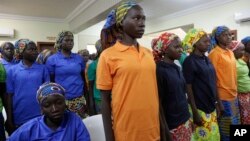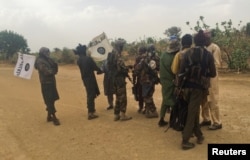Nigerians celebrated last week as 82 of the Chibok schoolgirls abducted by Boko Haram were released and returned to the capital, Abuja. A total of 103 girls have been released since the kidnapping more than three years ago.
Despite the joy, questions remain about the fate of the 113 girls still being held captive. Additionally, some are questioning the ethics and long-term implications of the negotiating tactics used by the Nigerian government.
Talks to free the girls date back several years. In October 2016, 21 girls were released, although few details were given at the time about what was exchanged for their release.
Prisoner swap part of deal
This time, the government revealed that a prisoner swap was part of the deal, including the release of “field commanders” for Boko Haram.
“There is a lot of speculation about the centrality of these commanders to Boko Haram's tactics and to its operations, but no further information has been released,” said Hilary Matfess, senior program officer at the Center for Democracy and Development in Abuja. "There are unsubstantiated rumors that for both the initial release of the 21 Chibok girls and this subsequent negotiation that money was also exchanged, but it is nearly impossible to prove that."
The latest negotiation also may have been successful because of the secrecy that surrounded it.
Talks involved the Swiss government, the International Committee of the Red Cross, and local intermediaries like barrister Zannah Mustapha and Asiha Wakil, a lawyer and human rights activist.
“I think the reason why the last two negotiations in the end of 2016 and the one just this week have been successful is that it has been below the radar,” said Jacob Zenn, an expert on Boko Haram and African affairs analyst at the Jamestown Foundation, speaking to VOA's Hausa service from Abuja.
“In other words, there have been very few leaks. Those involved in the negotiation are keeping a very close circle, and Boko Haram has always hated leaks,” said Zenn. “They [Boko Haram] don't want information coming out, so I think there must be some modicum of trust.”
Success takes time
Zenn believes the negotiations will continue for the remaining girls, but at a slow pace, perhaps stretching on for another six months or so.
He also said it is important to acknowledge the cost of the exchange, which involves the release of high-level fighters who could restore Boko Haram's weakened fighting capacity.
“That's the price that needs to be paid and it's likely a high price, but given the importance and the trauma that Nigeria as a country has faced in this whole Chibok situation, the government obviously deemed it was acceptable,” said Zenn.
Negotiations continue
The Nigerian government has vowed to continue pushing for the release of the remaining girls.
“We will not relent until all are back," said Aisha Alhassan, minister of women's affairs and social development.
The final push may be the most difficult. Matfess said thousands of women have been abducted by the group over the years, but the Chibok girls have garnered the most media attention. However, rescuing them is complicated by a number of factors, including the fact that some have been married or impregnated by fighters and may not want to be freed.
Stockholm syndrome?
Over the weekend, Maida Yakubu, one of the Chibok girls, appeared in a video explaining why she doesn't want to return to her parents. Speaking in Hausa and holding an AK-47 while wearing a black burqa and sitting along with three other girls, she said she had not been forced to marry and now believes her parents are not correctly worshipping Allah.
“I urge you to join us,” she told the audience of the video.
“There is fear that a lot of them have developed Stockholm syndrome for their captors,” Matfess said. Stockholm syndrome is term for a kidnap victim's development of trust in or feelings of affection for a captor — a psychological alliance that serves as a survival strategy.
“It's worth noting that one of the first Chibok girls to escape — and this happened a number of months back — escaped with her husband and actually was questioning when she was in front of the media what had happened to her husband and saying that she missed him.
"That's certainly a hurdle … you can't force them to agree to be released, so that may complicate negotiations going forward,” Matfess said.





